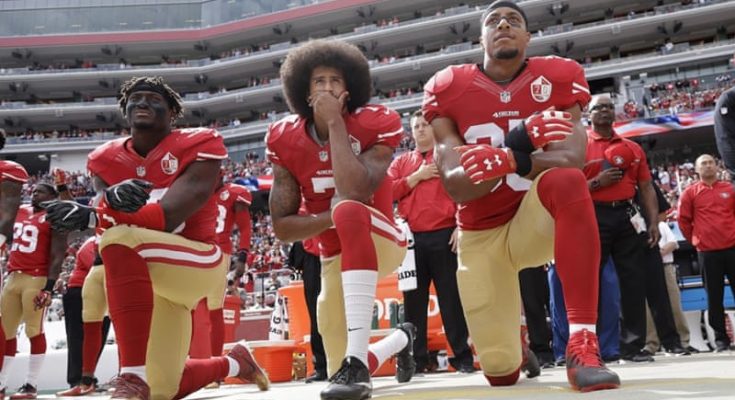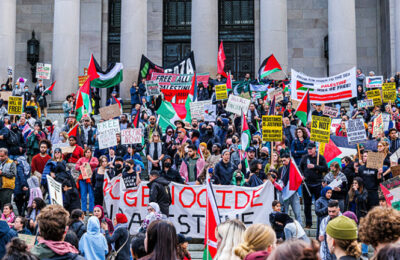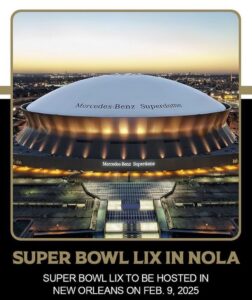The NFL will enact a national anthem policy for 2018 that requires players and league personnel on the sideline to stand but gives them the option to remain in the locker room if they don’t want to stand, NFL Commissioner Roger Goodell announced Wednesday.
Under the change approved by team owners at the Spring League Meeting, individual clubs will have the power to set their own policies to ensure the anthem is being respected during any on-field action. If a player chooses to protest on the sideline, the NFL will fine the team. The player also could be fined by his team, NFL Network Insider Ian Rapoport and NFL Network’s Judy Battista reported.
Goodell said the six changes under the policy were unanimously approved by team owners who voted. San Francisco 49ers owner Jed York said he abstained from voting, in part, due to the lack of player involvement in the decision process.
“The policy adopted today was approved in concert with the NFL’s ongoing commitment to local communities and our country — one that is extraordinary in its scope, resources, and alignment with our players,” Goodell said in a statement. “We are dedicated to continuing our collaboration with players to advance the goals of justice and fairness in all corners of our society.
“It was unfortunate that on-field protests created a false perception among many that thousands of NFL players were unpatriotic. This is not and was never the case.”
Eagles safety Malcolm Jenkins, one of the leaders of the Players Coalition, expressed his displeasure with the policy Wednesday.
“What NFL owners did today was thwart the players’ constitutional rights to express themselves and use our platform to draw attention to social injustices like racial inequality in our country. Everyone loses when voices get stifled,” Jenkins said in a statement.
“While I disagree with this decision, I will not let it silence me or stop me from fighting. The national conversation around race in America that NFL players forced over the past two years will persist as we continue to use our voices, our time and our money to create a more fair and just criminal justice system, end police brutality and foster better educational and economic opportunities for communities of color and those struggling in this country.
“For me, this has never been about taking a knee, raising a fist or anyone’s patriotism but doing what we can to effect real change for real people. #thefightcontinues.”
The NFL Players Association says it was not consulted about the new policy before owners voted on it.
Freedom of Petition Specifies
In the United states, the right to petition (or Freedom of Petition) is guaranteed by the First Amendment to the Constitution, and it specifically prohibits Congress from abridging “the right of the people … to petition the Government for redress of grievances.” Its roots within the colonies can be traced back to the Declaration of Independence.
The petition clause concludes the First Amendment’s ringing enumeration of expressive rights and, in many ways, supports them all. Petition is the right to ask government at any level to right a wrong or correct a problem.

Contemporary use
Two hundred years after the Colonial era, however, petitioning has become an instrument of mass politics, designed to make a point, not a plea. As with the divisive issue of slavery, petitioning is now seen as a means of uniting popular groups and overwhelming political opponents.
As one modern commentator put it, petitions “were the sound bites of the early nineteenth century.” Though some individual appeals persisted, public petitioning lost its local character and its immediacy, becoming instead a political ultimatum enforced at the ballot box. The authors and signers of mass petitions did not intend to convey a personal appeal. Nor did they seriously expect a personalized response.
Instead, they were giving their representatives a preview of election day by showing the depth and extent of public sentiment on issues such as slavery, women’s suffrage and the admission of new states into the Union. As the young nation matured, its democratic visions broadened the franchise, established political parties, fostered a national press and, after the shock of the Civil War, expanded the federal government. The United States had entered the industrial age of modern politics and markets that eclipsed strictly local loyalties.
Patrick Henry, firebrand patriot of the founding generation, had seemed to predict this atomizing of citizenry and centralizing of authority when he protested constitutionalism:
“The act, called the Bill of Rights, comes here into view. What is it but a bargain, which the parts of government made with each other to divide powers, profits and privileges? You shall have so much, and I will have the rest; and with respect to the nation, you shall have the right of petitioning.”
But the 200 years since belie Henry’s mocking denigration of the petition clause.
Petition today
“Petitioning” has come to signify any nonviolent, legal means of encouraging or disapproving government action, whether directed to the judicial, executive or legislative branch. Lobbying, letter-writing, e-mail campaigns, testifying before tribunals, filing lawsuits, supporting referenda, collecting signatures for ballot initiatives, peaceful protests and picketing: all public articulation of issues, complaints and interests designed to spur government action qualifies under the petition clause, even if the activities partake of other First Amendment freedoms.
The NFL Owners To Its Players, “I wish you would take a knee. Now, run up and down that field. Entertain us! I own you. I’m an owner!”
— NFLPA (@NFLPA) May 23, 2018









